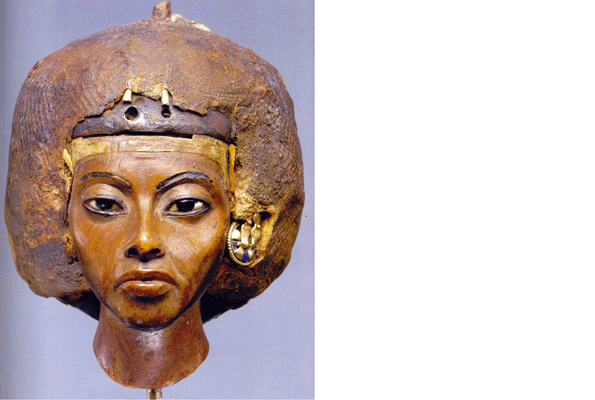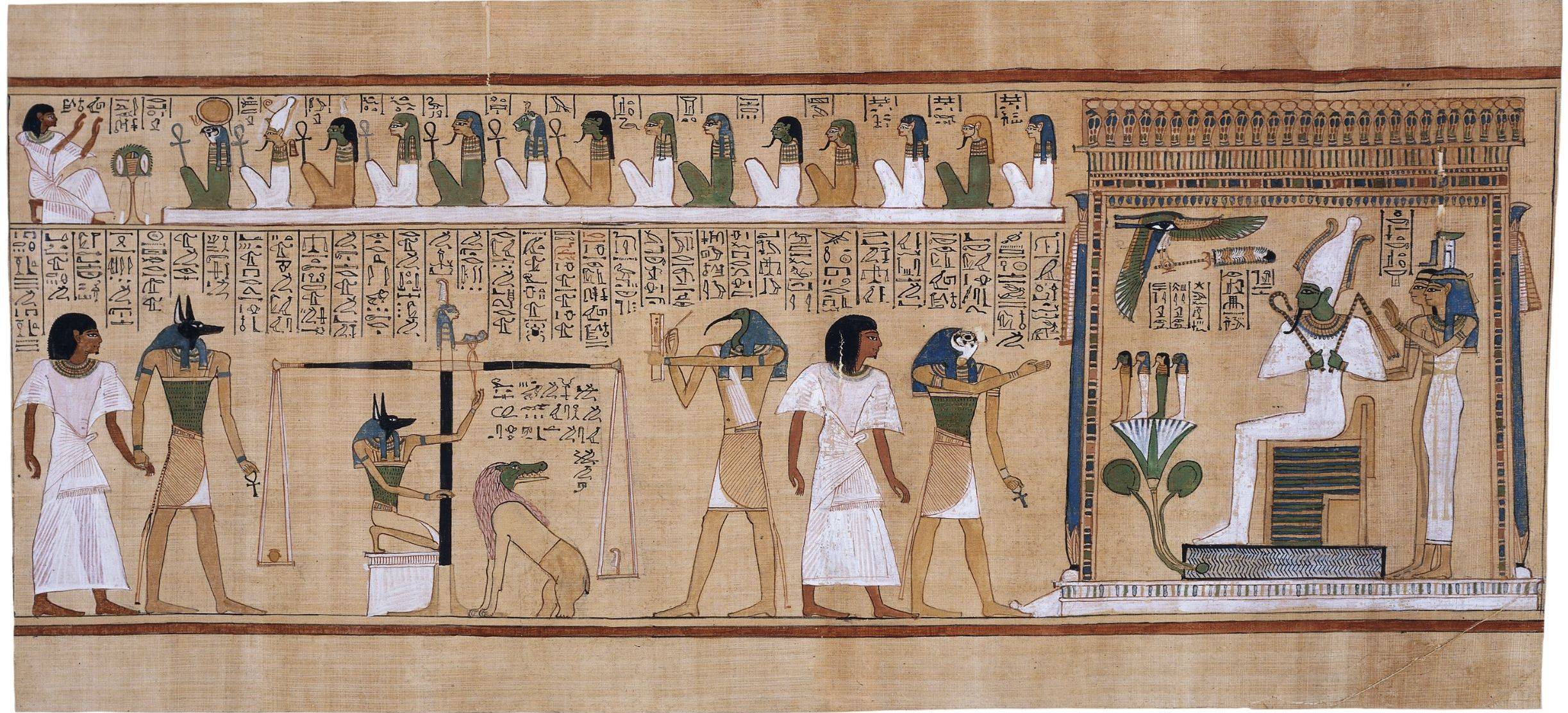The question When did the ancient Egyptians discover or reach the Nile Headwaters? begins with the premise that the African Ancient Egyptians (pre 332 B.C.E.) did not originate at the headwaters of the Nile; and the accepted answer uses the secondary sources, that is non-indegenous Africans, or Greeks, to posit the idea that the African Ancient Egyptians not only did not originate in sub-Sarahan Africa, but did not "discover" the headwaters of the Nile.
The controversy over the so-called "race", see American Anthropological Statement on Race
Historical research has shown that the idea of "race" has always carried more meanings than mere physical differences; indeed, physical variations in the human species have no meaning except the social ones that humans put on them. Today scholars in many fields argue that "race" as it is understood in the United States of America was a social mechanism invented during the 18th century to refer to those populations brought together in colonial America: the English and other European settlers, the conquered Indian peoples, and those peoples of Africa brought in to provide slave labor.
As they were constructing US society, leaders among European-Americans fabricated the cultural/behavioral characteristics associated with each "race," linking superior traits with Europeans and negative and inferior ones to blacks and Indians. Numerous arbitrary and fictitious beliefs about the different peoples were institutionalized and deeply embedded in American thought.
Early in the 19th century the growing fields of science began to reflect the public consciousness about human differences. Differences among the "racial" categories were projected to their greatest extreme when the argument was posed that Africans, Indians, and Europeans were separate species, with Africans the least human and closer taxonomically to apes.
Ultimately "race" as an ideology about human differences was subsequently spread to other areas of the world. It became a strategy for dividing, ranking, and controlling colonized people used by colonial powers everywhere. But it was not limited to the colonial situation. In the latter part of the 19th century it was employed by Europeans to rank one another and to justify social, economic, and political inequalities among their peoples. During World War II, the Nazis under Adolf Hitler enjoined the expanded ideology of "race" and "racial" differences and took them to a logical end: the extermination of 11 million people of "inferior races" (e.g., Jews, Gypsies, Africans, homosexuals, and so forth) and other unspeakable brutalities of the Holocaust.
"Race" thus evolved as a worldview, a body of prejudgments that distorts our ideas about human differences and group behavior. Racial beliefs constitute myths about the diversity in the human species and about the abilities and behavior of people homogenized into "racial" categories. The myths fused behavior and physical features together in the public mind, impeding our comprehension of both biological variations and cultural behavior, implying that both are genetically determined. Racial myths bear no relationship to the reality of human capabilities or behavior. Scientists today find that reliance on such folk beliefs about human differences in research has led to countless errors.
of the African Ancient Egyptians continues today within the scope of western academia, see Ancient Egyptian race controversy; Were the ancient Egyptians white?; The Nile Valley Civilization and the Spread of African Culture by Yosef ben-Jochannan, where the quote by Yosef ben-Jochannan
When we speak of the Nile Valley, of course we are talking about 4,100 miles of civilization, or the beginning of the birth of what is today called civilization. I can go to one case of literature in particular which will identify the Africans as the beginners of the civilization to which I refer. And since I am not foreign to the works of Africans in Egypt, otherwise called Egyptians, I think that should be satisfactory proof. This proof is housed in the London Museum that is holding artifacts of Egypt. In that museum you will find a document called the Papyrus of Hunifer. At least you should find it there. It was there when Sir E. A. Wallace Budge used it in his translation as part of the Egyptian Book of the Dead and the Papyrus of Hunifer.
It was there at that time, a copy of which is in the library of Syracuse University in New York, and I quote from the hieratic writing, "We came from the beginning of the Nile where God Hapi dwells, at the foothills of The Mountains of the Moon." "We," meaning the Egyptians, as stated, came from the beginning of the Nile. Where is "the beginning of the Nile?"
is refuted by western academia, notwithstanding the published work in Origin of the ancient Egyptians by Cheikh Anta Diop in General history of Africa, II: Ancient civilizations of Africa; 1986 at page 44 where the origin of the African Ancient Egyptians is evidenced as having a sub-Saharan origin; and the fact that DNA evidence substantiates that claim
Ancient Egyptian Pharaohs related to Ugandans - DNA by David Sepuya Kalanzi (Saturday August 16 2014)
(An ancient bust of Queen Tiye of ancient Egypt retrieved by archaeologists now at Altes Museum in Berlin, Germany, shows she was a black African.)
This year, Ugandans have witnessed the use of DNA tests to settle prominent public cases in the media concerning the paternity of children and of celebrities who have died. What has not been known to many people is the dispute concerning the ethnicity of the ancient Egyptians by scholars in the 20th Century. This dispute has been solved scientifically by the DNA tests conducted on the mummies of the ancient Egyptians in 2012 and 2013.
In December 2012, DNA tests were conducted on the mummies of Pharaoh Rameses III and his son, which proved that they belonged to human Y chromosome group E1b1a. This is the Y chromosome group of Sub Saharan Africans who speak Niger–Congo languages.
The disclosed Y chromosome group of the Pharaoh, at the time of releasing the report, was considered as just one of the details to make the investigation scientifically solid with facts. But its revelation caused a stir equal to the purpose of the original forensic investigation. Another group of mummies from the Amarna period of Egyptian pharaohs were tested by DNA Tribes, an American Company which specialises in conducting DNA tests, in 2013.
The conclusion of the tests were that the mummies autosomal profiles would be most frequent in the present day populations of the African Great Lakes region and Southern Africa. Subsequent analysis of the autosomal profile of the mummy of Pharaoh Rameses III also concluded that this matched the genetic profiles of the population of the Great Lakes region as well.
This questions presents the exact opposite premise: that that African Ancient Egyptians did originate in sub-Saharan Africa, and asks what the primary source evidence is which refutes this premise.
From the perspective of living African Ancient Egypptians descendants across this planet today, the African Ancient Egyptian ancestors prior to the invasion of Ancient Egypt by Alexander of Macedonia in 332 B.C.E. are black Africans whose origin is up south, or sub-Sharan Africa from the origin of the Nile spanning the length and breadth of the Nile, to down north.
The theory that the African Ancient Egyptians are not "black" or indigenous Africans is primarily argued by Europeans, modern Arabs and "Middle Eastern" academia; or so-called "white people", filtering down or up to "white nationalists" or "alt-right" making statements in political interviews using the same language as is used by the U.S. Government in administrative regulations governing the U.S. census apparatus, see Roland Martin Confronts White Nationalist Richard Spencer On NewsOne Now
MARTIN: The greatest genius came from the building of the Pyramids. Do you know...
SPENCER: Those were white people.
MARTIN(incredulously): Who were white people?
SPENCER: The Egyptians were not Africans. I'm sorry.
MARTIN: The greatest genius came from the building of the Pyramids. Do you know...
SPENCER: Those were white people.
MARTIN(incredulously): Who were white people?
SPENCER: The Egyptians were not Africans. I'm sorry.
MARTIN: Do you know where Egypt is?
SPENCER: Yes. It's in North Africa.
Without an overview of the subject matter it might be simple to dismiss the term "North Africa" as some region which must be defined, somewhere, though it is not defined by indigenous Africans - it left undefined by the individuals who use the language: Europeans for the political and economic purpose of claiming the similarly fictitious creation of "North Africa" and "Middle East", which are military and geopolitical terms, as the origin for the invented "white" "race"; or land patent claims, see Appendix A - Revisions to the Standards for the Classification of Federal Data on Race and Ethnicity
White – A person having origins in any of the original peoples of Europe, the Middle East, or North Africa.
where "Middle East" and "North Africa" cannot be found on any map of the actual nations on this planet, Earth; save for perhaps strategic military maps, not maps used by the common people of the planet.
From the perspective of at least a modicum of literature published by western academia and white supremacist propaganda, the African Ancient Egyptians are viewed to have not originated at the headwaters of the Nile, and are not representative of the modern political construct "black", as in "black" "race", as the term "black" is not clearly defined by the very documents which purport to define a "black" "race", and, in fact acknowledges that "race", as indicated by the American Anthropological Association Statement on Race, is not related whatsoever to biology, anthropology or genetics, see United States Census Bureau About Race
What is Race?
The data on race were derived from answers to the question on race that was asked of individuals in the United States. The Census Bureau collects racial data in accordance with guidelines provided by the U.S. Office of Management and Budget (OMB), and these data are based on self-identification.
The racial categories included in the census questionnaire generally reflect a social definition of race recognized in this country and not an attempt to define race biologically, anthropologically, or genetically.
Black: A person having origins in any of the black racial groups of Africa.
where "black" is defined as ... "black". If we take it a step further we find that "race" is not defined by any Public Law enacted by Congress of the United States, see Is the term “race” defined by Public Law enacted by Congress of the United States.
Excluding the fictitious stories in the Bible, Talmud, and Torah, and the geopolitical premise and phrase "Middle East" is not in Africa proper and that "North Africa" actually exists, and accounting for the fact that "race", including so-called "black" and "white" are purely political constructs not having anything whatsoever to do with biology, what are the primary sources for the western academic notion that the African Ancient Egyptians are not indigenous black Africans whose origin is so-called sub-Saharan Africa, or modern day Uganda, Chad, Sudan, Ethiopia, Eritrea, Kenya, Somalia, Tanzania, Congo, et al., who traveled down north to found and rule Ancient Egypt for thousands of years prior to 332 B.C.E.?

